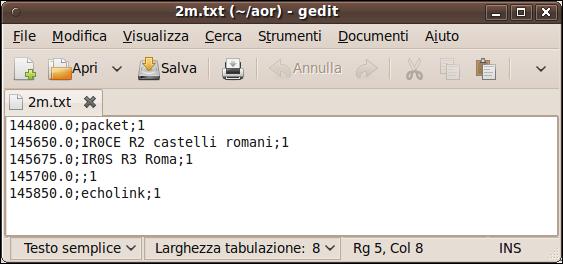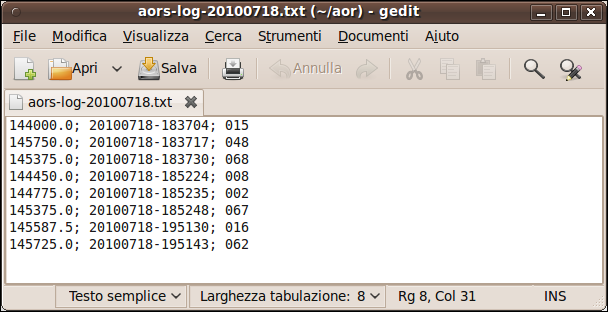aor_search
A multi platform search management software for the AOR
8200/8600 receivers

aor_search is a small widget
designed to perform unattended explorations of the radio spectrum.
Users can setup frequency range, step and mode to perform the search
with. Not only active frequencies will be logged, but:
-
received audio can be recorded in a file;
-
users can provide "skiplists", i.e. list of known frequencies not to
care about.
The general idea was to have a software doing the boring job of sifting
frequencies while I was at work. Coming back in the evening I'd then
find a nice list of active frequencies I didn't know about. Logging
alone would have already been interesting, but the availability of
audio recordings really maximises utility of the tool.
While there are some packages available doing the same thing, most of
them are commercial and nothing seems available for Linux. (BTW I like arctl but I never managed to make it talk with the frequency db).
Widget is written in Tcl/Tk and can therefore work on several different platforms. Tcl/Tk 8.5 is required.
Ubuntu users: please note that 8.4 seems to be standard issue with this
distro, so you'll have to explicitly download the new version from the
repository and launch the software with:
wish8.5 aor_search.tcl
Once Tcl/TK is installed you can download the software from here and extract it in your folder of choice.
The
AOR-like font for the display is included in the folder: under Linux
simply double click on it to have it installed. Under Windows you may
have to drag it into the fonts folder.
There's come setup to be done before you can fire the search:
- specify the serial port in use to control your receiver
- set the proper audio recording command
Both are done via the "options" button and screen

Communications between pc and radio are preset at 19200 bps. There's no point in setting it faster, as the onboard controller is much slower in replying to commands.
It's a good idea to launch software from the command line instead of
double clicking on it, as some startup information is shown in the
console that may help fixing problems. Alternative configuration files
can be used specifying path and filename after the command line. In
fact an alternative config file is provided in the folder for Windows.
Should the software refuse to start due to problems in configuration, you can manually edit the aor_search.cfg
file with a text editor.
Common occurrences:
- widget configured to work with a serial device that is now unavailable: edit the comport line to point to an existing device
- widget was used last time with a skiplist (see below) that has been since renamed or deleted: edit the skiplist line to point to a valid file

Suggested folders:
- Linux: $HOME/aor
- Windows: c:\aor using spaces in the folder name is a very bad idea, as Windows still doesn't handle them consistently
Audio recording is left to other utilities you can have available on
your pc: a box under "options" will allow setting the command to fire
it. Under Linux arecord works
fine and several solutions are available under Windows. Unfortunately
we've been unable so far to find a suitable non commercial software under
Mac OSX (no, Sox didn't work reliably).
Requirements for the audio recording software:
- work from the command line, with recording length and filename being specified as the last two parameters.
- accept a recording duration parameter
- [nice to have] selection of input in case you've got more than one soundcard
Under Windows I found HDOGG works very well: please note that it must already be running when invoked from aor_search.
You can then proceed setting search range, mode and step. This is done via the "parameters" button/screen and is rather obvious:

"Bank" refers to the search bank the parameters will be written in, as
the built-in search function is used in order to get maximum speed.
Please note: chosen search bank will be overwritten by these settings!
The "pause" value determines how long shall the scanner stay and record
on a busy frequency. Maximum allowd by the radio is 60 seconds. Setting
higher values or zero will cause malfunction in the software.
This
paramater will be written in search group 9 on the radio.
Please note: search group 9 settings will be overwritten!
Occasionally weird behaviour has been observed, with the radio refusing
to restart a search after a signal was found: I'm still scratching my
head on this, but to be on the safe side check the following.
Access the search bank config menu by FUNC+SRCH and check that
parameters for bank 9 are as follows:
- no letters selected
- DELAY OFF
- LEVEL OFF
- VOICE OFF
- FREE 01s
- AUTO STORE OFF
"Skiplist" is where you can load you frequency database.
It' a plain text semi-column separated file made of three fields:
- frequency in kHz
- label: user or whatever comes handy
- put a "1" if you want the frequency to be skipped during search

You can have as many skiplists as you like saved on your pc, however
only one at a time can be invoked: just compose them to suit your
search.
Putting frequencies in ascending order will make editing easier for
you and software operation maybe slightly faster on big lists. If you
didn't, shell command "sort" may do the trick.
If you don't want to skip any frequency, just load the provided "skip0.txt" file.
An example for the 2m band is provided within the compressed folder.
Once everything is set you can start searching. Active frequencies will
be displayed on screen and logged in a file named after date and time
when the search was started. Again, it's a semi-column separed plain
text file listing:
- frequency
- date-time
- RSSI (Relative Signal Strength Indicator): check radio user manual to get more info about the "LM" command reading.

Please note that while pausing on an active frequency the "Stop" button
will look unresponsive. It will in fact execute your command once the
pause and recording are over.
Software has been so far tested under:
- Ubuntu Linux: tested at max for about 10 consecutive hours, works fine
- Mac OSX: occasional Tk crashes
- Windows XP + ActiveState Tcl: ok
While testing it I already found a bunch of frequencies that escaped my searches in the past.
This is it: I really enjoy my AR8600 and AR8200 and hope this widget
will help you to enjoy them more if you like alternative operating
systems.
Suggestions, bug reports and thank you notes are greatly appreciated.
My thanks to GiorgioFox and Funatic for pushing me in developing the software, providing ideas and testing.
AOR_SEARCH is released under GNU/GPL v3 license.
Release history:
0.96 16Oct2010 what's new: .cfg file may be specified as an argument;
config box for audio recording software allows more parameters; aor
font working on windows too
0.95 20Jul2010 initial release
Contact:
Published: 20Jul10 - Updated ofr 0.96 release October10
Home







